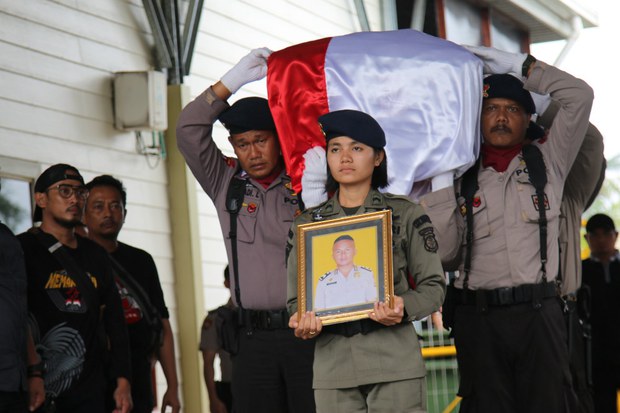Indonesian Defense Chief: Papuan Rebels Must be ‘Crushed’
2019.08.14
Jakarta
Indonesian Defense Minister Ryamizard Ryacudu called for a crackdown on separatist rebels in Papua province after suspected insurgents abducted and killed a policeman this week, the state news agency Antara reported Wednesday.
The officer, identified as Heidar, was found dead from gunshot wounds on Monday in Puncak regency after negotiations with his abductors failed, said Senior Commissioner Ahmad Musthofa Kamal, a spokesman for police in Papua.
“Those rebels have to be finished and crushed. They can’t just kill people with reckless abandon,” Ryacudu said in a video released by Antara on its website. “Don’t let them do what they are doing. Launch an operation and crush them.”
The Indonesian military deployed 600 soldiers to nearby Nduga regency in March to safeguard the completion of the Trans-Papua Highway, four months after separatist rebels allegedly killed 19 members of a crew working on the project and a soldier there. The 600 were in addition to 154 police and soldiers dispatched to the region immediately after the killings.
The West Papua National Liberation Army (TPNPB) claimed responsibility for the killings, saying the workers were members of the military’s engineering detachment.
On Wednesday, a team monitoring the humanitarian situation in Nduga urged Indonesia’s government to pull troops out of the regency.
“From the outset we have called on the government to withdraw the troops because it is civilians who are harmed,” said Theo Hasegem, director of the Papuan Justice and Unity and a member of the humanitarian team.
Speaking to reporters at a news conference hosted by Amnesty International in Jakarta, Theo said about 1,000 soldiers and police had been sent to Nduga since the December killings.
The anti-insurgency campaign forced more than 20,000 residents to flee to the forest and neighboring regencies to avoid being caught in the violence, Theo said, adding that at least 182 people had died of hunger and disease after fleeing.
“People died because they had been in the jungle for too long,” he said. ”They were sick and hungry and there was no medical help.”
The team urged the government to open Nduga to journalists, church workers and human rights observers so they could see “the truth.”
The soldiers were serving an important role, Indonesian Armed Forces (TNI) spokesman Maj. Gen. Sisriadi said.
“The TNI’s task there is only to help the national police to safeguard the construction of transportation facilities,” he told BenarNews.
The Trans-Papua highway is part of President Joko “Jokowi” Widodo’s push to upgrade infrastructure in Papua, much of which is covered by jungle and road networks are limited. The project is scheduled to be completed this year.
“We also help the police catch criminals but we do not harm to civilians,” Sisriadi said. “We have rules of engagement, and we comply with existing laws.”
He said only one battalion consisting of about 600 soldiers was in Nduga.
National police spokesman Dedi Prasetyo, meanwhile, said police were there to protect the regency’s civilians.
“The fact is people feel safe and go about their activities as usual,” he told the Tempo news website.
On Monday, Tempo quoted Air Force officials as saying that a search involving civilian flights was still under way for a military helicopter with 12 servicemen on board that disappeared during a flight in Papua on June 28.
The Russian-made Mil Mi-17 lost contact with ground control minutes after lifting off from Oksibil in Papua’s mountainous Pegunungan Bintang regency, military officials said.
Decades of conflict
A low-level separatist conflict has been taking place since the 1960s in Papua, where the population is predominantly Melanesian. Papua declared its independence from Dutch colonial rule on Dec. 1, 1961, but that was rejected by the Netherlands and later by Indonesia.
In 1963, Indonesian forces invaded the region and annexed it. In 1969, the region held a referendum in which security forces selected slightly more than 1,000 people to agree to Papua’s formal absorption into the nation, according to human rights advocacy groups.
This week, the Indonesian government criticized the tiny Pacific island-nation of Vanuatu for including an exiled Papuan separatist leader, Benny Wenda as part of its delegation to the Pacific Islands Forum (PIF), which opened Tuesday in Tuvalu, a tiny nation of 6,000 people.
“We have conveyed our protest through our ambassador in Fiji last week, both in writing and in person with the Secretary General of the PIF in Suva, Fiji, last week,” Indonesian Foreign Ministry spokesman Teuku Faizasyah said Monday.
He said Vanuatu’s action amounted to interference in Indonesia’s domestic affairs and “a hostile act.” Indonesia is not a member of the PIF but has been granted dialogue partner status.
Wenda, who is based in Britain, was expected to be among speakers at the forum as a member of the Vanuatu delegation.
The head of the United Liberation Movement for West Papua (ULMWP), Wenda said last month that three rebel groups had agreed to unify militarily under the banner of the West Papua Army.
Indonesian military officials dismissed his claims, saying they were a ploy to gain public support.
Ahmad Syamsudin in Jakarta contributed to this report.








